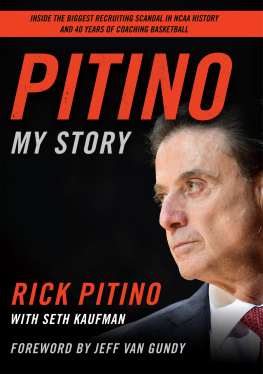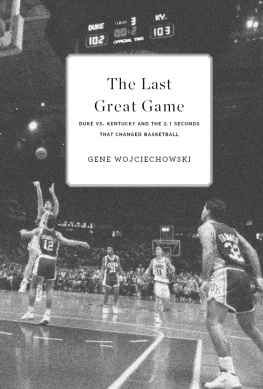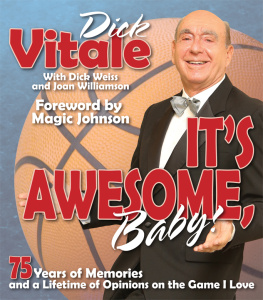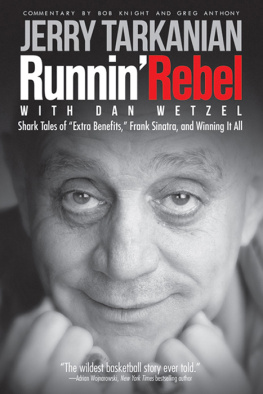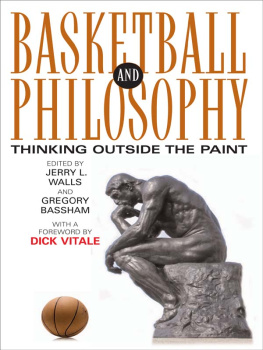



Diversion Books
A Division of Diversion Publishing Corp.
443 Park Avenue South, Suite 1008
New York, New York 10016
www.DiversionBooks.com
Copyright 2018 by Rick Pitino
All rights reserved, including the right to reproduce
this book or portions thereof in any form whatsoever.
For more information, email
First Diversion Books edition September 2018.
Hardcover ISBN: 978-1-63576-562-5
eBook ISBN: 978-1-63576-563-2
Printed in the U.S.A.
SDB/1809
1 3 5 7 9 10 8 6 4 2
I ded icate this book to my wife, Joanne, who has endured so much heartache and painyou are my champion.
I also dedicate it to my five incredible children: Michael, Christopher, Richard, Ryan, and Jacqueline.
Contents
FOREWORD
IN THE SPRING of 1986, I had just finished a mediocre first season as the Varsity Basketball Coach at McQuaid Jesuit High School in Rochester, New York. Stu Jackson and Herb Sendek, the two full-time assistant coaches at Providence College for Rick Pitino, stopped by McQuaid to talk to me about my best player, Greg Woodard. From that brief meeting came my biggest professional break. Coach Pitino hired me as his graduate assistant coach.
Graduate assistant coaches salaries and job requirements are very different today from what they were in 1986. Back then, Providence College provided me a small stipend and free tuition. However, after a week or so on the job, I realized that I would have no time to go to classes. The workload and the 24-hour-a-day commitment Coach expected left no time for classes or homework. I bypassed getting my Masters in Education from Providence and instead got my Doctorate in Basketball from Coach Pitino.
That 198687 season will be forever remembered in Rhode Island for our Final Four run led by Billy Donovan and Coach. Billy was as valuable a college basketball player as there has been since the institution of the 3-point shot, and no coach has ever maximized a teams limited ability like Coach Pitino did that year.
But the Final Four is not what I remember most about that glorious season. Ill always remember the process that led to the winning. At that point, there was no 20-hour-a-week limit on practice time, nor was there a required day off for student-athletes as there is now. Our team committed to the plan Coach Pitino laid out: An hour of practice before breakfast in the morning, an hour of individual instruction for our players during breaks in the academic day, followed by a three-hour team practice in the afternoon. Then it was dinner, study hall, and one hundred free throws to end the day.
Day after day. Week after week.
The Friar players voluntarily committed to a process that gave them their best chance at success. No team ever deserved to win more than that team. No coach ever extracted more from less.
Coach Pitino was a demanding, confidence-boosting visionary. When the 3-point shot was introduced, he understood immediately how to maximize its potential and how to create quality 3-point shots while also defending the line. The strategy gave us a margin of error against more talented teams. He ushered in the pick-and-roll offensive attack that is so prevalent today. At the time, the Bob Knight motion offense dominated the game, and we were the only team around relying on that pick-and-roll set. His match-up zone press was unique, and we played fast with one of the slowest teams in the country.
Im proud of our success. But Im equally proud that we achieved all of it the right way! I saw up close that you could demand great effort on the court, care deeply about the players off-the-court development, and still win big at a place like Providence, a school that had struggled badly since joining the Big East Conference. And I saw that you did not have to compromise your integrity or cut corners to get the results necessary in major college basketball.
Since that 198687 season, I have followed Coach Pitinos teams closely. We never worked together again, but the investment he made in me as a young coach has brought about a loyalty that will never be shaken and will never be broken. He won big at Providence, rebuilt the New York Knicks on their way to an Atlantic Division title, brought the University of Kentucky back to glory, had some bad lottery luck with the Boston Celtics, and finally came back to the state of Kentucky and built a power at the University of Louisvillehighlighted by their NCAA championship and multiple Final Fours. Unfortunately, so many people now forget so much of what Coach accomplished and all those he has positively impacted. Instead, most focus on how and why he left Louisville.
Thats where this book Pitino: My Story comes into play. After months of enduring speculation, rumors, innuendo, and shocking headlines that attacked his professional integrity, Coach Pitino gets to tell his side of the story in an unvarnished fashion. Its his time to set the record straight, and then its up to you to decide who and what you believe.
I will always be grateful and indebted to Coach Pitino for giving me a chance to pursue my dreams in coaching. Now I urge you to give Coach Pitino the same chance he gave me many years ago. Read his story and decide for yourself. Thirty-two years ago, he taught our team at Providence College to dream big dreams and then put in the work to achieve those dreams. Now my dream for Coach is for some brave college athletic director to read this book and believe in Coach the way our Providence team believed in him, and give him another opportunity to do what he does as well as anyone who has ever coached basketballwin big and help the young men that play for him develop their full potential as players and people.
Jeff Van Gundy
NBA Analyst
Former Head Coach of the
Houston Rockets and New York Knicks
PROLOGUE
I WAS TALKING about leadership when the scandal that would destroy my career came crashing down.
Some ironies are more painful than others. That one hurts.
David Novak, the former CEO of fast-food giant Yum! Brands Corp., was in my office at the University of Louisville on the morning of September 26, 2017. He had come by to tape a forty-five-minute talk for a podcast devoted to honing leadership skills. I locked my office door to ensure we wouldnt be interrupted. As a guy with a pretty good track record of helping players and assistant coaches get to the next level, I had a few thousand thoughts to share. Predictably, forty-five minutes stretched to more than two hours.
Suddenly, my longtime executive assistant, Jordan Sucher, unlocked the door. Jordan essentially coordinated everything in the Louisville basketball officefrom my schedule to team travel to what each assistant coach was up to. I always considered him pretty unflappable. But I could see he was upset.
Coach, we have to end this, Jordan said. Theres a major problem.
I was surprised by the urgency in Jordans voice. I think David was, too, because when I turned to apologize for abruptly ending our talk, he was ready to leave: Weve got enough here for the podcast. Dont worry about it.
Jordan directed me to our conference room. Kenny Klein, our director for media relations, and John Carns, our compliance director, were there. Everyone looked grim.
Next page
